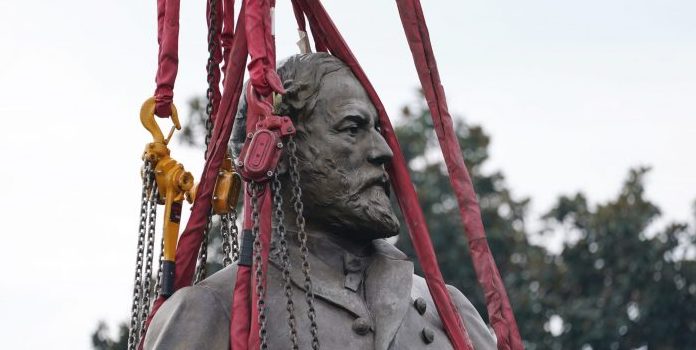(Ezekiel Loseke, Headline USA) Congress’s Naming Commission, which was tasked under a 2020 defense-spending bill with renaming military bases and other memorials that honored members of the Confederacy, has released its second report, including proposals for the cancelation of Gen. Robert E. Lee.
The commission’s report “is recommending renaming facilities and removing depictions dedicated to Robert E. Lee and other leaders at West Point and the U.S. Naval Academy,” according to Politico.
It pointed out that the institutions most targeted by the commission were a barracks building and a gate at the U.S. Military Academy in West Point, N.Y. They also were displeased with a portrait of Lee that hangs there.
The top Confederate general—whose father was a Revolutionary War hero—famously graduated from West Point and was offered a commission with the U.S. Army at the outbreak of the Civil War but opted to remain loyal to his native Virginia.
After brokering the South’s surrender in 1865, he went on to a distinguished career as the president of what would be renamed Washington and Lee University.
The House of Representatives voted to restore his citizenship in 1975, with then-President Gerald Ford remariking, “General Lee’s character has been an example to succeeding generations, making the restoration of his citizenship an event in which every American can take pride.”
The Naming Commission also targeted other West Point memorials, which included monuments honoring Confederate Army officers P.T.G. Beauregard and William Hardee.
The U.S. Naval Academy in Annapolis, Md., meanwhile was tasked with renaming the Buchanan House, which houses the superintendent and was named on behalf of Admiral Franklin Buchanan.
Another targeted Confederate veteran was Matthew Maury, an astronomer and officer in the Confederate Navy. For now, an engineering building at Annapolis bears his name.
The commission showed some restraint.
Per Politico, it opposed removing artifacts in museums because “the purpose of these museums is to collect, preserve, exhibit, and interpret historically significant artifacts pertaining to that base, mission, or other focus.”
The commission was also leaving the historic graveyards alone. “No grave markers at the United States Military Academy or the United States Naval Academy … would be considered for removal,” said its report.
The Naming Commission insisted it is not erasing history.
Rather, it claimed, “they make these recommendations to affirm West Point’s long tradition of educating future generations of America’s military leaders to represent the best of our national ideals.”
The commission did not explain how it could simultaneously remove historical monuments, names and honors, without “erasing history.”

